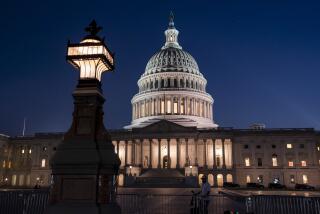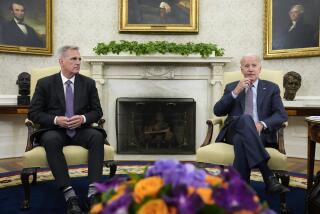Delayed trade deals show strains between Obama, Congress
- Share via
Congressional approval of long-delayed trade pacts was heralded this week as a moment of bipartisan cooperation between the White House and the GOP, but in fact there was great difficulty in reaching that achievement, underscoring how challenging it will be to find common ground in the future.
In a single day, Congress accomplished a legislative feat that had eluded lawmakers for years, approving trade pacts with South Korea, Colombia and Panama that had been left over from President George W. Bush’s administration.
The result was an unusual political victory shared by President Obama and congressional Republicans during a year of partisan warfare. And it arrived just in time for the South Korean President Lee Myung-bak, who celebrated the accomplishment during a speech before Congress and at a state dinner at the White House.
“It was good to finally see both parties in Congress come together and pass legislation that is good for the American people,” Obama said Friday, touting the legislative achievement as he met with autoworkers at a GM plant near Detroit.
But interviews with those familiar with the negotiations reveal an underlying sense of distrust and frustration on both sides of Pennsylvania Avenue.
Far from being the start of a new day of political cooperation, the trade pacts show just how hard it is for Obama and Congress to get along.
“Our point is, it didn’t have to wait so long,” said a senior Republican official familiar with the talks. “It could have been done a lot easier and a lot quicker.”
In comparison to some of the major economic issues on the Congressional horizon, the trade pacts were supposed to be relatively easier political lifts, typically proposals that can find a level of bipartisan consensus. The three pacts were approved easily this week with large majorities, which is why those familiar with the negotiations were left so frustrated by the process.
House Speaker John A. Boehner (R-Ohio), who had given Obama his word in February that he would bring both the trade pacts and the assistance program up for a vote, grew “befuddled,” according to the Republican familiar with the process.
When Obama called Boehner to congratulate him on their accomplishment, Boehner, rather than relish the moment, complained that the president was mischaracterizing Republicans as lacking their own jobs plan.
Democrats had their own frustrations with Republicans. Conservative Republicans were opposed to renewing the trade assistance program, which traditionally had bipartisan support. They saw it as an ineffective waste of money.
But the trade pacts couldn’t get support from Democrats without the worker assistance program. The White House wasn’t willing to give up that leverage until the worker aid was hammered down, according to one senior administration official.
Trust has been a fragile commodity this year in Washington. Bruising partisan fights to avert a government shutdown in spring and a federal debt default in summer left a lasting uneasiness.
At the White House, officials describe the months-long slog to pass the trade deals as influenced heavily by those battles. It left a wariness.
Eventually, congressional leaders, including Sen. Harry Reid (D-Nev.), worked out a deal that would allow the trade pacts and the assistance program to move in tandem. Congress gave speedy approval. The South Korean president expressed his gratitude during an address to Congress on Thursday.
More to Read
Get the L.A. Times Politics newsletter
Deeply reported insights into legislation, politics and policy from Sacramento, Washington and beyond. In your inbox three times per week.
You may occasionally receive promotional content from the Los Angeles Times.












